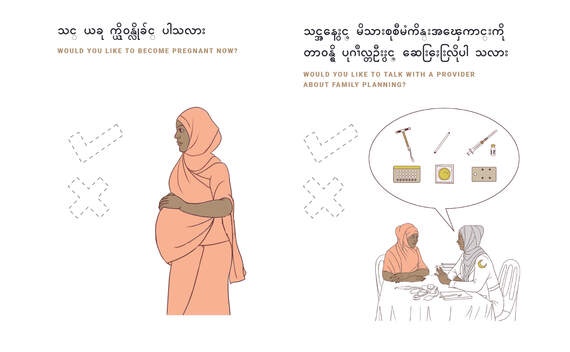The Rohingya, a Muslim minority group in Myanmar, face violent religious persecution in their home country and almost a million have fled, seeking refuge in Bangladesh. On their journeys or in the camps, many women and girls have experienced abuse and sexual assault—yet most don’t know that they have the right to access menstrual regulation (early abortion services) under Bangladeshi law, and community healthcare workers have trouble overcoming language barriers to deliver the information and care they need. Ipas Bangladesh recognized a gap in health education and teamed up with IDEO.org to understand how to connect women to the services they need.

During research, the team noticed that in the transition to the more adverse, makeshift living conditions of the refugee camps, Rohingya families embraced new ways of thinking and going about their lives. While large family sizes were common in Myanmar, where Rohingya families had large farms with an abundance of food and space, they had to adjust their perspective given the cramped living environment and relative scarcity of resources. For example, during project design we had assumed that men, who hold most decision-making power for the household, would act as barriers to access of menstrual regulation. However, after sitting down with almost 200 community members, we found that not only did some men understand the importance of family planning for the health of their families, but even religious leaders, such as imams, recognized the urgency of the circumstances called for different measures. We started thinking about how to disseminate information about contraception and menstrual regulation in collaboration with physicians, imams, and mahjis (community leaders) who are trusted sources of information.

These insights were instrumental to the design of Khele-Khele Shikhi—a program that honors existing religious discourse, while also inviting husbands, wives, and trusted community members to make family planning a topic of community discussion. By including men in a conversation they haven’t traditionally been a part of, Ipas hopes to encourage shifts in behaviors and conditions that will support women in accessing accurate information and help couples make decisions together.

Khele-Khele Shikhi starts with a game of trivia. Men and women, who usually operate in different spheres, are invited to play in separate group-based sessions. They form two teams and compete by answering trivia questions on topics related to health, family planning, the Quran, and how to support their families to have healthy, peaceful lives. Each session is facilitated by role models who inspire openness, offer explanations, and encourage candid conversations. An imam, majhi, or doctor facilitates the men’s session and a community health worker facilitates the women’s session. Following the game, husbands receive a take-home conversation guide that helps them make decisions together with their wives on their desired family sizes and plans. By inviting husbands to introduce the topic of family planning in his home, women no longer have to deal with the barrier of bringing up a difficult conversation and convincing their husbands.
The experience culminates in a conversation with a community health worker in the family’s home or the clinic. The CHWs use a flipbook that conveys information in a visual, approachable way for low- literacy audiences, and solves language barriers with captions in Rohingya and Bangla. The program continues to weave faith, community, and play in the journey towards family planning.
Khele-Khele Shikhi is currently in an evaluation phase, but the Ipas team hopes to expand the program to other humanitarian areas.






